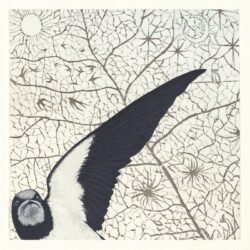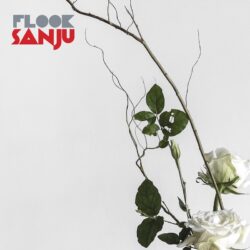
The latest Folk Roundup is a pretty mixed bag on what we (loosely) call Folk music, with the welcome return of a long-serving – but relatively small outputting – band in the form of Flook, as well as what seems to be becoming a regular Welsh contribution to the column. Good. And there’s what we might call “cultured” folk with carefully crafted harmonies which sit a long way from traditional sounds. And a concept album on the theme of trains. A lively mix then, and hopefully that makes for an interesting variety with something for…well…dare we say…”everyone“? Read on and discover.
 “Passengers & Pioneers” is an album curated by singer-songwriter Sam Slatcher, which celebrates 200 years of The Stockton & Darlington Railway, the railway that began the modern passenger railway. It includes contributions from Sam Slatcher and the poets Lizzie Lovejoy, Carmen Marcus, Rowan McCabe, and Harry Gallagher, together making a mix of music and spoken word pieces from the arts project ‘Storylines’, which was commissioned by the Bishop Line Community Rail Partnership. It adopts not the obvious retelling of just the history of the railways, but instead, many of the various works are drawn from the stories and recollections of travellers on the line. There is a tendency to project regret and longing – regret for the sharp axe of Beeching and longing for familiar spaces that the train can take one to – as on the poem by Lizzie Lovejoy that makes up half of the album’s closing track ‘Take me Home.’ Rowan McCabe delivers a punchy ‘The Poetry Train‘ which laughs a little at the very art project to which it contributes, whilst Sam Slatcher and Carmen Marcus imagine the possibilities of performing a meditative train journey, incorporating the rhythms of the diesel engine and the clack of the tracks. The historical side of the story is well served by ‘My Dear Sister‘, which sets an eyewitness account, in a letter, of engine trials two centuries ago to a gentle acoustic guitar-led melody. An interesting mix – but perhaps not one that will get heavy repeat plays. (6/10)
“Passengers & Pioneers” is an album curated by singer-songwriter Sam Slatcher, which celebrates 200 years of The Stockton & Darlington Railway, the railway that began the modern passenger railway. It includes contributions from Sam Slatcher and the poets Lizzie Lovejoy, Carmen Marcus, Rowan McCabe, and Harry Gallagher, together making a mix of music and spoken word pieces from the arts project ‘Storylines’, which was commissioned by the Bishop Line Community Rail Partnership. It adopts not the obvious retelling of just the history of the railways, but instead, many of the various works are drawn from the stories and recollections of travellers on the line. There is a tendency to project regret and longing – regret for the sharp axe of Beeching and longing for familiar spaces that the train can take one to – as on the poem by Lizzie Lovejoy that makes up half of the album’s closing track ‘Take me Home.’ Rowan McCabe delivers a punchy ‘The Poetry Train‘ which laughs a little at the very art project to which it contributes, whilst Sam Slatcher and Carmen Marcus imagine the possibilities of performing a meditative train journey, incorporating the rhythms of the diesel engine and the clack of the tracks. The historical side of the story is well served by ‘My Dear Sister‘, which sets an eyewitness account, in a letter, of engine trials two centuries ago to a gentle acoustic guitar-led melody. An interesting mix – but perhaps not one that will get heavy repeat plays. (6/10)
 Welsh folk singer Gwilym Bowen Rhys‘ fifth album “Aden” continues his path of mixing traditional and new songs at all times championing his native language. On opener, ‘Coed Glyn Cynon‘, which decries and condemns the felling of woodland by the English, Rhys has the gruff anger of Dick Gaughan. ‘Y deryn du’ is a lilting love song – sung alternately in Welsh and English which carries a melancholic subtext in its musical accompaniment. Dispelling any such grief, ‘Gwn Dafydd Ifan‘ is a boisterous tall tale of a legendary 19th-century rifleman, which includes the raucous sing-a-long “Ni ddaw unrhyw niwad i´r Cymry neno´r tad Tra bo Dafydd Ifan a´i wn yn y wlad” (“no harm at all will come to the Welsh, in the name of the father, while Dafydd Ifan and his gun is in the land“).
Welsh folk singer Gwilym Bowen Rhys‘ fifth album “Aden” continues his path of mixing traditional and new songs at all times championing his native language. On opener, ‘Coed Glyn Cynon‘, which decries and condemns the felling of woodland by the English, Rhys has the gruff anger of Dick Gaughan. ‘Y deryn du’ is a lilting love song – sung alternately in Welsh and English which carries a melancholic subtext in its musical accompaniment. Dispelling any such grief, ‘Gwn Dafydd Ifan‘ is a boisterous tall tale of a legendary 19th-century rifleman, which includes the raucous sing-a-long “Ni ddaw unrhyw niwad i´r Cymry neno´r tad Tra bo Dafydd Ifan a´i wn yn y wlad” (“no harm at all will come to the Welsh, in the name of the father, while Dafydd Ifan and his gun is in the land“).
There are also a couple of instrumentals on the album – ‘Y tebot‘ is a delightful dance tune, whilst the fiddle and harp-led ‘Wil Treffynnon‘ takes a more stately approach. Gwilym is joined on the album by Gwen Màiri (lever harp / triple harp/harmonium), Patrick Rimes (fiddle, viola, harmonium, trombone), Ailsa Mair (Viola da Gamba), Will Pound (harmonica, melodeon) and Aled Wyn Hughes (double bass). The collection was recorded at Stiwdio Sain, Llandwrog, with Aled Wyn Hughes. With the mix of material and the excellence of the playing “Aden” is an album to hear (7/10).
Wise Woman have been told, “You guys absolutely rock.” There’s a lot to unpick there – unsurprisingly, Wise Woman is a band of women (Anna Pool, Lydia Bell, Charlotte Vaughan & Maddie Cutter), and the compliment was given on Radio 3, not usually regarded as the natural home of rock. However it is a very appropriate place to find Wise Woman as their latest EP attests – “Hold The Wonder” showcases a modern take on a capella harmony singing across five songs. The songs may have a political slant – ‘Smiley Face‘ addresses the prejudice that certain story readers in libraries encounter from the point of view of a small child excited to go to storytime. Or they may address the difficulty of calling the spirit of artistic genius into the world as on ‘Hymn to a Genius‘. It is a very particular take on folk – skirting into cabaret territory – and is well performed and recorded. But, it is a very particular take on folk, which can find one voice singing whilst the other voices add “o-wa-o o-wa-o” and “ding ding a-ding” as backing rhythm. It’s a little bit Swingle Singers in tone – and that is either a good thing or a bad thing, depending on the listener. Try a listen see what you think (5/10).
 “Sanju”, the latest release from Flook, finds the band thirty years into their musical career doing what Flook does so well – blending Irish and English folk traditions on five long instrumental tracks. There’s a lot of light and sparkle throughout, and although the tunes do have a meaning behind them as titles such as ‘Tie The Knot In Georgia/Ed’s Big Five-O/Faqqua‘ reveal there’s plenty of room for the listener to project their own thoughts and feelings onto the sounds.
“Sanju”, the latest release from Flook, finds the band thirty years into their musical career doing what Flook does so well – blending Irish and English folk traditions on five long instrumental tracks. There’s a lot of light and sparkle throughout, and although the tunes do have a meaning behind them as titles such as ‘Tie The Knot In Georgia/Ed’s Big Five-O/Faqqua‘ reveal there’s plenty of room for the listener to project their own thoughts and feelings onto the sounds.
Flook are Sarah Allen (flute and accordion), Brian Finnegan (wooden flutes, low whistle and tin whistle), Ed Boyd (guitars and bouzouki) and John Joe Kelly (bodhrán and mandolin) – and for all that the other instruments do matter the band’s key sound is that combination of bodhrán and the various flutes and whistles, the one driving the jigs and reels onwards and the other adding a quicksilver sparkle to the tunes. Not a hugely prolific band – and all the members have other bands and side-gigs – they are a band with a singular sound, and it’s a sound pretty much guaranteed to brighten the day of any listener. (7/10)
Iona Lane‘s new album “Swilkie” is a double – the studio version and the live version with a more limited accompaniment. On the studio version, the highland singer is supported by Ben Nicholls on double bass; Louis Campbell on guitars/banjo; Malin Lewis on fiddle/pipes; Signy Jakobsdottir on drums/percussion; Jen Austin on piano; Alex Lyon on bass clarinet/clarinet; and Jenny Sturgeon, Josie Duncan and Michael McGovern on backing vocals. The album was written during three residencies on the Isle of Eigg, Isle of Mull and Sanday in Orkney and not unexpectedly calls on the history, folklore and ecology of these islands on songs which are sometimes deceptively low-key and “gentle”. There’s nothing really gentle about a song like ‘Torus‘, which tells of human interaction with Basking Sharks – once thought to be coils of giant sea serpents, and then at the end of the 19th century hunted to near extinction. The phrasing of the song, and Lane’s vocal to some extent, is reminiscent of Bella Hardy. ‘Staffa‘ is a vibrant depiction of the tiny basalt granite island (famous for its puffins and Finegal’s Cave) which concentrates on the isolation and geological beauty of the rock itself – ‘Silent‘ makes a nod to the puffins, though, as it invokes the solitude that is possible on such a small piece of land.
The live album (available only with physical copies of the album or via Bandcamp) takes the evocative imagery of the songs down to their essence with simpler accompaniment and offering the proof that Iona Lane can more than carry the music into the live setting. It’s as good – in its own way – as the studio recording, and together, they are clearly the album of the month. (8/10)


